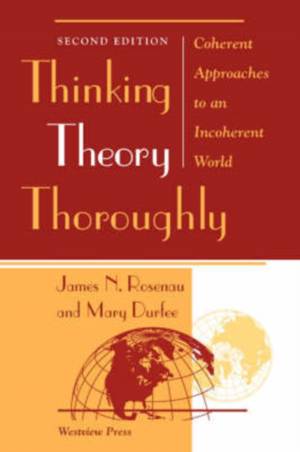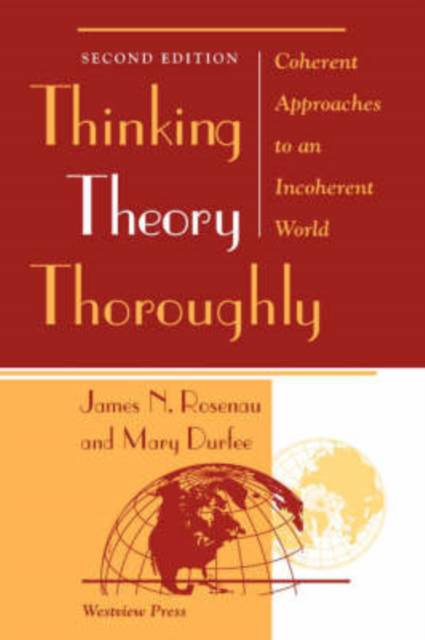
Door een staking bij bpost kan je online bestelling op dit moment iets langer onderweg zijn dan voorzien. Dringend iets nodig? Onze winkels ontvangen jou met open armen!
- Afhalen na 1 uur in een winkel met voorraad
- Gratis thuislevering in België vanaf € 30
- Ruim aanbod met 7 miljoen producten
Door een staking bij bpost kan je online bestelling op dit moment iets langer onderweg zijn dan voorzien. Dringend iets nodig? Onze winkels ontvangen jou met open armen!
- Afhalen na 1 uur in een winkel met voorraad
- Gratis thuislevering in België vanaf € 30
- Ruim aanbod met 7 miljoen producten
Zoeken
Thinking Theory Thoroughly
Coherent Approaches to an Incoherent World
James Rosenau, Mary Durfee
Paperback | Engels
€ 90,45
+ 180 punten
Uitvoering
Omschrijving
Think theory is thoroughly removed from explaining international crises such as Bosnia, Rwanda, and Korea? Think again! James Rosenau and Mary Durfee have teamed up to show how the same events take on different coloration depending on the theory used to explain them. In order to better understand world politics, the authors maintain, theory does make a difference.Thinking Theory Thoroughly is a primer for all kinds of readers who want to begin theorizing about international relations (IR). In this second edition, realism (the dominant theoretical perspective in IR), postinternationalism (Rosenau's famed turbulence paradigm), and liberalism are treated together in a chapter that compares them along various analytic dimensions, which makes the book even more useful.In this new edition, the order and content of case chapters have been changed to better reflect the ways theory can be used to organize empirical material. The chapter on crises, which is now at the beginning, shows how systemic theories might cope with problems and evidence of a more local and temporally constrained nature. A chapter on the U.N. illustrates how systemic theories can cope with institutions, and the last chapter, on Antarctica, delineates how systemic theories can be used to generate hypotheses that then demand different kinds of evidence.
Specificaties
Betrokkenen
- Auteur(s):
- Uitgeverij:
Inhoud
- Aantal bladzijden:
- 288
- Taal:
- Engels
Eigenschappen
- Productcode (EAN):
- 9780813366760
- Verschijningsdatum:
- 31/12/1999
- Uitvoering:
- Paperback
- Formaat:
- Trade paperback (VS)
- Afmetingen:
- 152 mm x 229 mm
- Gewicht:
- 385 g

Alleen bij Standaard Boekhandel
+ 180 punten op je klantenkaart van Standaard Boekhandel
Beoordelingen
We publiceren alleen reviews die voldoen aan de voorwaarden voor reviews. Bekijk onze voorwaarden voor reviews.











